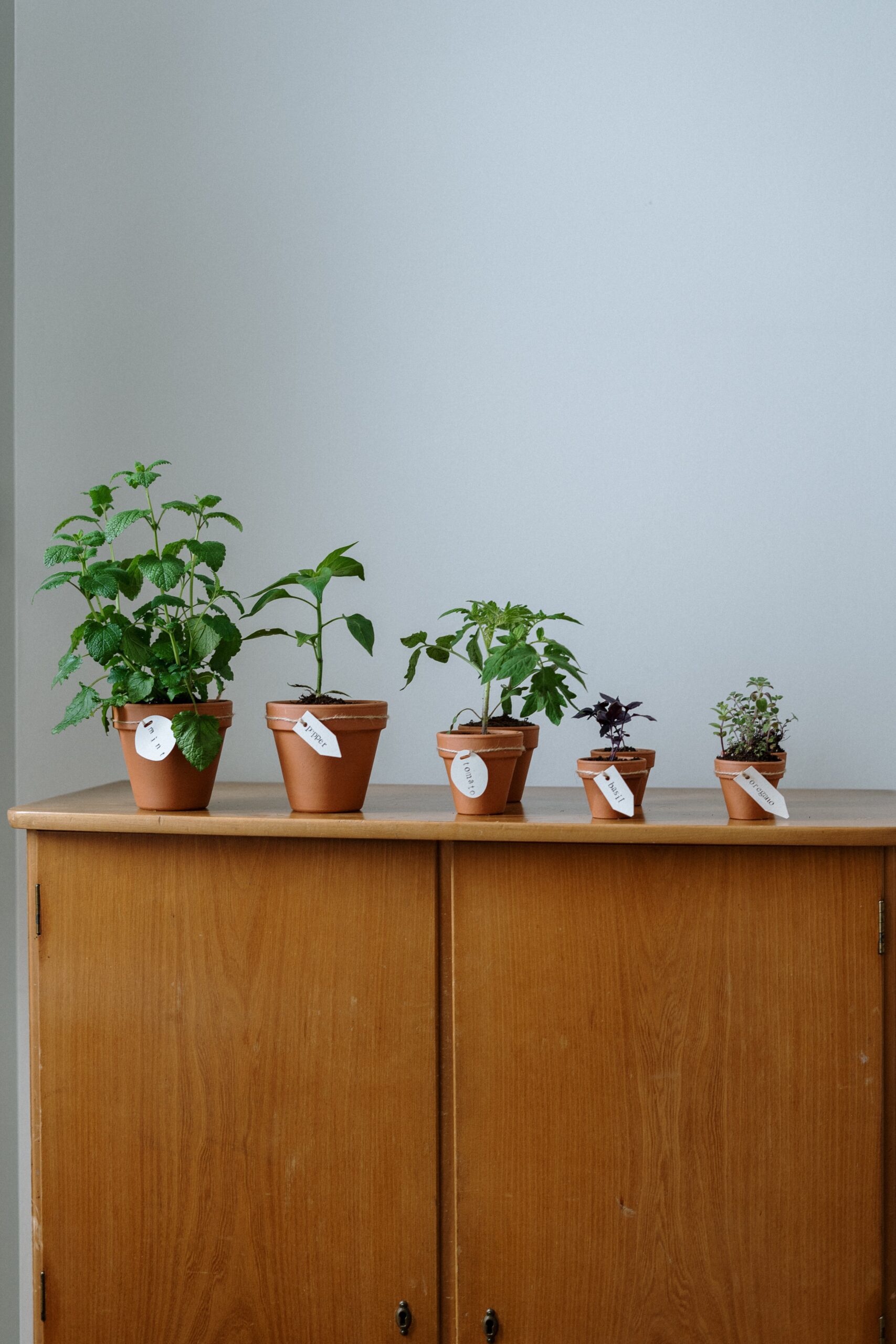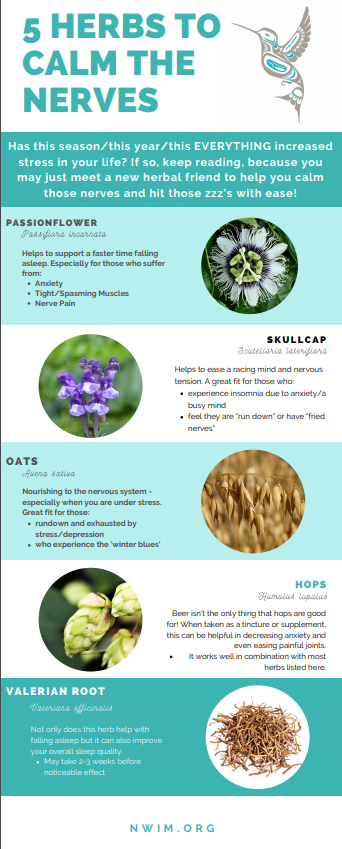As this new year begins, we continue to find ourselves asked to continue to adapt to changes. Despite these changes, it is likely that one thing remained consistent (or increased): stress levels! Stress interferes with many things in the body, but one direct impact that many have experienced is that of sleep disturbance and/or an increase in feelings of anxiety.
If any of this resonates with you, keep reading for a quick break-down of some herbs to aid in calming the nervous the system and helping you relax just in time for bed.
Here’s a quick dictionary to reference for some terms that may be unfamiliar:
- Anodyne – soothes/relieves pain
- Antispasmodic – relieves spasms/cramps
- Hypnotic – sleep inducer
- Nervine – has a beneficial/tonifying effect on the nervous system
- Sedative – soothes nerves/relieves tension
- Tonic – strengthening of targeted tissue or organ system
Passiflora incarnata
Common name(s): Passionflower, Maypop, Passion vine, Apricot vine
This beautiful flower has many different actions in aiding with relaxation. Its antispasmodic properties are perfect for those plagued by tight and tense muscles, its anodyne properties are helpful for those suffering from nerve pains, and its gentle sedative properties are great for those who may need extra help winding their body and mind down before bed. It works against anxiety by naturally promoting GABA levels (one of our neurotransmitters responsible for a calm state). One small study found that this herb worked just as well as a benzodiazepine (e.g. Xanax) when targeting anxiety, except the herb wasn’t associated with negative side effects the way the pharmaceutical was.
Caution: Avoid this herb if you are pregnant or breastfeeding.
Scutellaria lateriflora
Common name(s): Skullcap, Mad-dog weed, Helmet flower
Feel like your nerves are fried? Mind going a million miles a minute? This may be your new best friend. This wonderful herb was first used in a medicinal way by Native tribes for menstrual complaints. It is now widely used to support the central nervous system and ease nervous tension. If anxious thoughts keep you awake at night, you might enjoy keeping a tincture of this on your nightstand. While it acts to calm the nervous system, it also works to revive and restore it. Like passionflower, it also works as an antispasmodic, sedative, and anodyne. In fact, the two herbs pair well together for sleep support.
Caution: Make sure it’s a trusted source. Historically some products labeled as this herb contained a liver toxic herb.
Avena sativa
Common name(s): Oat
Maybe you suffer from the winter blues, or perhaps depression is a consistent issue for you. If that’s the case, then check out what oats can do for you. They actually act as a food for the nervous system – especially when it’s under stress. So, it can be especially helpful for exhaustion in cases of depression. Works well with other herbs (skullcap is a good partner).
Humulus lupulus
Common name(s): Hops
This plant was first noticed as a sedative when it induced drowsiness in field workers who had been picking it. Since then, it has been confirmed to be an effective sleep aid and also works to raise the neurotransmitter GABA, making it another great choice for anxiety. It also works as an anodyne and has been used to ease painful joints – something that often can interfere with relaxation. It works well with other herbs and can be combined with passionflower and valerian for insomnia and pain. It was actually studied in night shift workers and found to help with falling asleep. Like all these herbs, it can be taken in tincture form, but it has also been said that a satchel of dried herb under the pillow can promote sleepiness.
Caution: Not to be used in cases of severe depression.
Valeriana officinalis
Common name(s): Valerian root, Garden heliotrope
This root has been used for some time as a hypnotic and more recently, some small studies have shown overall improvement in sleep quality as well as a shorter time it takes to fall asleep in those with mild insomnia. However, like many of the herbs used for anxiety and sleep, the mix of available studies have yet to come to a conclusive recommendation when it comes to using it in the treatment of insomnia. Its typical uses, like most herbs in this list, are that of an anodyne, antispasmodic, and nervine.
Considerations – This herb can take longer ( 2-3 weeks) before positive effect is noticed. It may be more beneficial to try the other herbs first or use it in combination, rather than as a standalone herb.
Caution(s): May lower blood pressure. Some have side effect of headache or next day grogginess
As we enter a new year, consider adding something to your routine that helps support and strengthen your nervous system – something that has likely received a beating by 2020. You deserve to feel rested.
A Note on Dosing:
All these herbs are available in tincture forms and can be used in combination with each other or by themselves. For targeting stress and anxiety throughout the day you can dose it as one dropperful, three times per day. For sleep, take two droppers right before bedtime. The best way to take a tincture is in a small amount of liquid swished around the mouth before swallowing. (You can take it undiluted – but the alcohol content can sting the area under the tongue when used that way.)
Of course, it is always recommended to consult your provider before starting a new supplement or herbal regimen – especially if you are already taking medications.
References:
- Foster S, Johnson RL. Desk Reference to Nature’s Medicine. The National Geographic Society; 2006.
- Scalzo R. Naturopathic Handbook of Herbal Formulas: a practical and concise herb user’s guide 3rd ed. Kivaki Press; 1994.
- Hoffmann D. Holistic herbal: a safe and practical guide to making and using herbal remedies. Element Books; 1996.
- Dawson A. Herbs: Partners in life. Healing Arts Press; 1991.
- Tierra L. The Herbs of Life: Health & healing using western & chinese techniques. The Crossing Press; 1992.
- Akhondzadeh S, Naghavi HR, et al. Passionflower in the treatment of generalized anxiety: a pilot double-blind randomized controlled trial with oxazepam. J Clin Pharm Ther. 2001;26(5):363-367.
- Franco L, Sánchez C, et al. The sedative effects of hops (Humulus lupulus) , a component of beer, on the activity/rest rhythm. Acta Physiologica Hungarica. 2012;99(2):133-139.
- https://ods.od.nih.gov/factsheets/Valerian-HealthProfessional/


